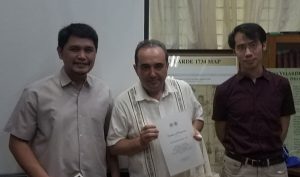
(Oct. 8) — In the book “The Routledge Companion to Fascism and the Far Right,” it is said Fascism has been “used as a pejorative term of abuse directed at people who are conservative, right wing or authoritarian in the traditional sense” since the end of World War II. This is due to its negative connotation of a dictator’s absolute control over the society and economy, where opposition is suppressed and violence is utilized to enforce national unity and stability.
This ideology was once popular worldwide. Back then, people used to think authoritarian rule is essential to the development of nations and countries, and the Philippines was no exception.
These ideas were discussed in the lecture of Prof. Florentino Rodao, PhD, “The Philippine Commonwealth and Rise of Fascism, 1935-1941” on Oct. 7 at Silid Balangay, Pavilion 2, Palma Hall.
As part of the “Talastasan sa Kasaysayan” lecture series by the UP Department of History, Rodao expounded on the background of fascism in the Philippine historical context.
He said fascism was prominent in the Philippines from 1935 to 1941. In this period, the military from the Spanish Civil War which called themselves Nationalists were supported by Fascist Italy and Nazi Germany. Eventually, their ideologies reached the Philippines and sparked the formation of the political parties such as Partido Fascista de Filipinas led by Miguel Cornejo and the Philippine Falange initially led by Andres Soriano and Martín Pou.
The Philippine Commonwealth under Manuel Quezon’s administration was also discussed. The period served as the transition to independence for the Philippines while the nation maintained good relations with foreign countries like the United States.
Although the administration was democratic, the Philippine Commonwealth still had influences from corporatist and authoritarian ideologies. One claim supporting this is that Quezon admired Mussolini, who led the fascist movement in Italy.
As a Spanish historian, Rodao focused his study primarily on Spain’s influences in the Philippines. He obtained his PhD at the Universidad Complutense de Madrid and furthered his studies at the University of Tokyo. His thesis is “The Spanish Community in the Philippines, 1935-1939: The impact of the War in Spain and the preparations for Philippine Independence in its evolution and identity.” His book “Franquistas sin Franco” (2012) looked into the experiences of the Spanish community during the Spanish Civil War and the Philippine community under the Commonwealth. —Aldric de Ocampo and Erika Sasazawa, featured image by UP Department of History
